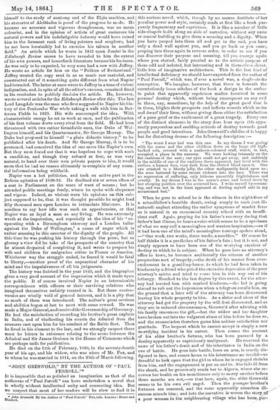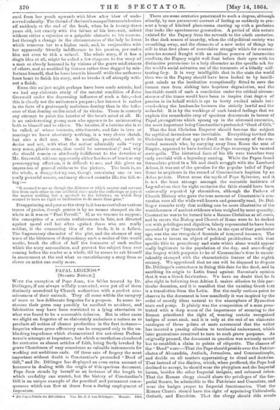"JOHN GRESWOLD," BY THE AUTHOR OF "PAUL FE RROLL."* IT
is impossible that so polished an imagination as that of the authoress of "Paul Ferroll " can have undertaken a novel that is wholly without intellectual unity and connecting idea. But we suspect that most of her readers will be slow to find it in
• John Gremooki. By the Author of "Paul Ferrell." Two.vol.s. Loudon: Hurst and Blaoke:t.
this curious novel, which, though by no means destitute of her
peculiar power and style, certainly reads at first like a book pur- posely fragmentary and capricious. It is like a number of little side-chapels built along an aisle of narrative; without any nave or central building to give them a meaning and a dignity. When
you have peeped into them all and got to the end, you have only a dead wall against you, and you go back as you came, peeping into them again in reverse order, in order to see if you can discover their purpose and meaning, till you emerge again where you started, fairly puzzled as to the artistic purpose of
these odd and isolated, but interesting and in themselves clever, little bits of imaginative architecture. This is the last kind of
intellectual deficiency we should have expected from the author of "Paul Ferroll," which was, if ever a novel was, a single-stroke conception. We imagine, however, that there is beneath the ostentatiously loose stitches of the book a design in the author to paint that apparently capricious malice involved in some persons' destiny which, without being consequent on any evil
in them, nay, sometimes, by the help of the great good that is in them, blights their prospects and inflicts wounds which m dm
and dwarf their lives, without giving them either the satisfaction of a pure grief or the excitement of a great tragedy. Every one
of the distinct elements in the story does bear upon this appa- rently purposeless and snubbing attitude of destiny towards good people and good intentions. John Greswold's childhood is happy
but for disturbing dreams of the following description :—
"The worst I ever had was this one. In my dream I was gazing with the nurse and the other children down on the large old high- backed sofa, covered with a nankeen-coloured staff, which, in fact, occupied a place in the nursery. We were looking intensely on the flat cushions of the seat ; our eyes could not get away, and suddenly in the middle of one of the cushions there appeared, just level with the surface, a human face, very dark from the clotted blood upon it. One eye crushed to a bloody jelly, the other malignantly fixed upon us ; the nose battered by some recent violence into the face. There was no expression of suffering, only hideous unearthly frightfulness and cruelty. In my dream I was in the nurse's arms and bowed down by her stooping position over the accursed face. I woke myself by scream- ing, and was not in the least appeased at finding myself safe in my accustomed bed."
When he goes to school he is the witness in the night-time of a schoolfellow's horrible death, owing simply to such (not ill- natured) neglect attending the earlier symptoms of scarlet fever as is natural in an economical country school with an insuffi- cient staff. Again, praying for his father's recovery during that father's last illness, he hears avoice which seems to be a specimen of what we may call a meaningless and wanton inspiration,—as if it had been one of the blind's meaningless tossings spoken aloud, —" One week, two weeks, three weeks, a sacrifice." Of course he half thinks it is a prediction of his father's fate ; but it is not, and simply appears to have been one of the worrying caprices of destiny to which he is subject. When he goes into an attorney's office in town, he becomes accidentally the witness of another purposeless sort of tragedy,—the death of his master from over- excitement in a gambling-house, to which he had been taken in kindness by a friend who pitied the excessive depression of the poor attorney's spirits and tried to rouse him in this way out of his lethargy. Shocked to the last degree by this event, for the attor- ney had treated him with marked kindness,—the lad is going abroad to rub out the impression when a telegram recalls him, on the ground that a later will of the attorney has been discovered leaving his whole property to him. As a sister and niece of the attorney had got the property by the will first discovered, and as they are in reduced circumstances, Greswold after advising with his family renounces the gift,—but the widow and her daughter have broken out into the vulgarest abuse of him before he does so, and the renunciation therefore gains him neither satisfaction nor gratitude. The bequest which he cannot accept is simply a new mortifying incident in his career. Then comes the account of his elder brother's fortune, who has been pursued by a destiny apparently as capriciously malignant. He received the news of his father's death and of his inheritance in India on the eve of battle. He goes into battle, loses an arm, is cruelly dis- figured in face, and comes home to his inheritance an invalid—so dreadful to look upon that the girl to whom he is engaged shrinks from him, and the engagement is put an end to. She falls ill from the shock, and he generously sends her to Algeria, where she re-
covers her health on his munificence only to marry another before three months are ont,—so that here, again, the elder Greswold seems to be his own evil angel. Then the younger brother's
fortunes are resumed, and the same apparently causeless
ill-
succers attends him; and into the narrative is woven the storypt a poor woman in the neighbouring village who has been, ur-
sued from her youth upwards with blow after blow of unde- served calamity. The thread of the hero's Inanqui fortunesis broken off suddenly at the end of the book, when he is twenty-three years old, not exactly with the failure of his love-suit, indeed without either a rejection or a palpable obstacle to his success, but through a change in the circumstances of the lady he loves which removes her to a higher rank, and, in conjunction with her apparently friendly indifference to his passion, per-glades
him not even to risk a refusal. The whole story, if it has a single idea at all, might he called a-few chapters in the story of a man so closely hemmed in by visions of the grave misfortunes of others, and so snubbed by fortune rather than dogged by mis- fortune himself, that he loses heart in himself, while the authoress
loses heart to finish his story, and so breaks it off abruptly with- out a finish.
Even this subject might perhaps have been made artistic, had we had any elaborate .study of the mental condition of John Greswold under the depressing influence of such a fate,—but this is clearly not the authoress's purpose ; her interest is rather in the facts of a grotesquely malicious destiny than in the influ- ence of that destiny on the mind of its victim. There is scarcely any attempt to paint the interior of the hero's mind at all. He is an uninteresting young man who appears to be uninteresting both to himself and to others. The heroine, if a heroine she is to be called, of whose interests, attachments, and fate in love or marriage we know absolutely nothing, is a very clever sketch, but also a dull one. She is sensible, practical, swift to devise and act, with what the author admirably calls "very easy sense, pliable sense, that could be nonsensical ;" and why she should remain so absolutely indifferent to the devotion of Mr. Greswold, without apparently either hardness of heart or any preoccupying affection, it is difficult to see, and this gives an impression of general coldness to the picture. The book is, on the whole, a disappointing one, though containing one or two really powerful scenes, and many shrewd remarks like the folksy- ing
"It seemed to me as though the distance at which master and servant live from each other in our artificial state made the sufferings or joys of the master nothing but a spectacle to the inferiors, on which they seemed to have no right or inclination to do more than gaze."
Disappointing and poor as the story is,it has nevertheless various traces of genius, though genius is by no means stamped on the whole as it was on "Paul Ferrol]." If, as we venture to suppose. the conception of a certain maliciousness in fate, not directed against moral evil but often against those who are really noblest, is the connecting idea of the book, it is a failure. The fragmentary character of the plot, and the absence of any trace of the bitterness of despondency such a malice of fate would excite, break the effect of half the instances of such malice which the story accumulates, and prevent the subject from ever
coming before the reader as a whole, till he comes to ask himself in amazement at the end what so unsatisfactory a story from so clever an artist can really mean.































 Previous page
Previous page